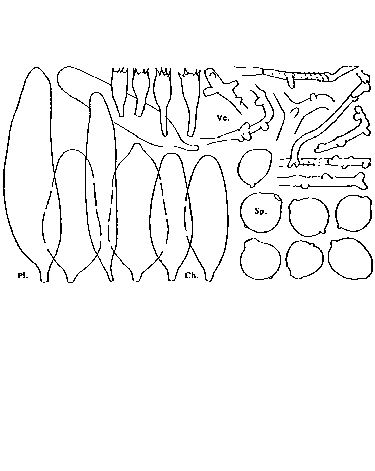Macroscopic features |
Pileus 3-8 x 2-5 mm when still closed, up to 15 mm when expanded, ellipsoid or ovoid, first white, soon greyish. Veil white, often somewhat yellow-brown in centre, breaking up in patches. Lamellae rather crowded, free, first white, then greyish, finally blackish. Stipe up to 30 x 1-1.5 mm, white, at base slightly bulbous. |
Microscopic features |
Spores [40,3,3] 6.3-8.5 x 5.8-7.8 x 4.6-5.7 µm, (sub)globose with apical, rather truncate papilla, dark red-brown, and central, 1.5-1.8 µm wide germ pore; Q = 1.00-1.20, av. Q = 1.05-1.10; av. L = 6.8-7.5, av. B = 6.3-7.2 µm. Basidia 14-28 x 6-8 µm, 4-spored, surrounded by (3-)4-5(-6) pseudoparaphyses. Pleurocystidia 50-90 x 16-28 µm, utriform, cylindrical, oblong or utriform. Cheilocystidia 30-80 x 10-26 µm, (sub)globose, ellipsoid, oblong or utriform. Elements of veil thin-walled, slightly diverticulate and incrusted, 2-6 µm wide, sometimes somewhat thick-walled (walls < 0.5 µm thick). Clamp-connections present. |
Habitat & distribution |
Solitary or a few together. Very rare. Only known from the Netherlands (two finds) and Germany (one find). The Dutch collections were made on moist filter-paper on which seeds of Petasites were germinating and in a greenhouse (substrate not noted). The German collection was found on a beam in the ceiling of a cellar. |
Remarks |
This taxon differs from Coprinus episcopalis in the distinctly smaller and more globose spores, smaller basidiocarps and smaller cystidia, and from C. gonophyllus in having slightly smaller spores with an apical papilla. Another difference is the habitat within buildings. |

[Copyright © by ]